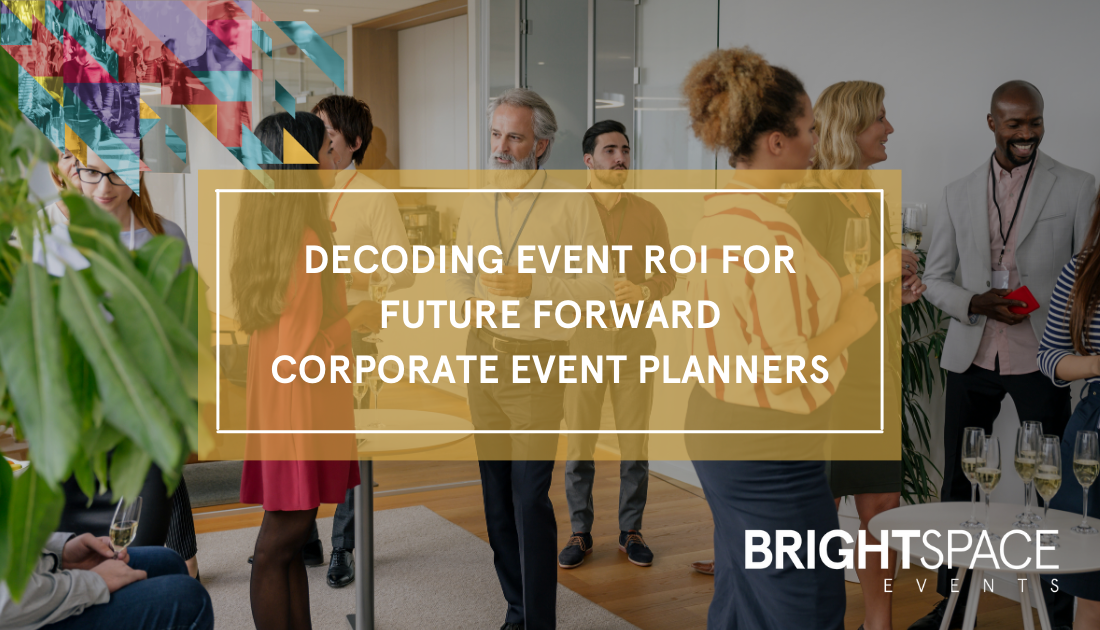The landscape of corporate events has shifted, and not just in the way events are delivered. You see, success is no longer solely judged by the applause of a captivated audience. Now, the focus is switching from traditional – or even no – event evaluation. Instead, today’s event planners are taking a more strategic approach that aligns events with overarching business objectives.
But, how do you measure event ROI, and what does it achieve? Let’s explore how you can methodically measure and analyse ROI in the context of internal and/or B2B events.
Setting the Scene with SMART Goals
The first step towards measuring event ROI is setting SMART goals:
Specific
Measurable
Achievable
Relevant
Time-bound
These objectives lay the groundwork for your event, by outlining exactly what you aim to achieve. Each objective needs to be tightly aligned with the company’s overall goals. For example:
- More event sign-ups
- Greater social media presence
- New lead generation
- Increased website traffic
- Boosted pipeline value
- High-volume, high-quality job applications
Checking the Pulse of Event ROI
Meaningful event ROI requires meticulous data collection. This means collating data points across the entire end-to-end event lifecycle, from pre-event engagement to post-event impact. The results can be transformational. But truthfully, the number crunching can be back-breaking without the right tools of the trade.
To this end, marketing platforms like HubSpot and CRM systems like Salesforce play a pivotal role in capturing data related to your SMART goals.
Quantifying the Intangibles
Tangible metrics like number of registrations and leads are clear markers of success, and they’re relatively simple to benchmark. Whereas intangibles call for a more anecdotal process.
These metrics matter, even though they’re more abstract. All the same, factors such as brand perception and customer or staff sentiment contribute significantly to ROI.
But, how do you measure them? There’s a variety of methods for collecting qualitative data, such as surveys, feedback forms, and post-event interviews, which all provide invaluable insights.
Translating Event ROI Analytics
So, you’ve gathered all sorts of previously unimaginable metrics. But there’s no point having them if you don’t know what to do with them.
Imagine tracking the journey of a lead from event engagement to conversion. It provides a clear picture of how the event contributed to the sales pipeline.
This is why it’s essential to be able to decipher the story behind the numbers, using tools like Google Analytics, social media analytics platforms, and CRM systems.
Drumming Up Stakeholder Buy In
Even though attitudes to the value of events can differ greatly between different stakeholder
groups, event ROI analysis extends beyond the events team. This is because truly holistic assessment needs buy in from various departments, such as HR and line management building event ROI into the appraisals process.
Think of it like this. Getting various stakeholders involved in the process increases your chances of comprehensively evaluating how an event aligns with broader business goals. And that’s something most stakeholders are likely to have more than a passing interest in.
Pioneering the Cultural Shift
Embracing the concept of event ROI might seem like a daunting cultural shift. So, start small to win over any naysayers, by showcasing the tangible benefits of the approach. Even the most resistant stakeholders will be more inclined to embrace change when you can demonstrate the correlation between well-defined event objectives and tangible outcomes.
It’s a transformation that might not happen overnight, but ultimately lays the foundation for a more intentional and impactful event strategy.
Catalyst for Change
Event ROI calls for meticulous planning, data collection, analysis, and a cultural shift that permeates the entire organisation. While shifting the dial might require patience and perseverance, it’s a golden opportunity to pave the way for events to be more than just gatherings, but powerful drivers of business growth.
At Brightspace Events, we not only deliver unforgettable events. In addition, we understand the ever-evolving role of events in the corporate landscape, equipping us with a bigger picture overview that supports and drives strategic business growth.
Get in touch when you’re ready to evolve professional event delivery into a data-driven success story that supports your overall business goals.







